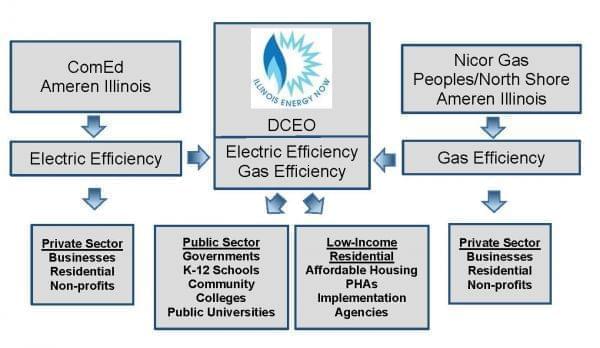Budget Stalemate Extends To U of I Energy Research

A flow chart laying out the goals of the Smart Energy Design Assistance Program. (Smart Energy Design Assistance Center)
Illinois’ budget impasse is not only hitting the state’s most vulnerable populations. It’s also affecting applied research on the University of Illinois campus. The Smart Energy Design Assistance Center was forced to close its doors this week, temporarily laying off about 50 people.
Since 2004, the facility has provided free help to owners of both public and private buildings in the state, recommending energy efficiency measures.
Associate Professor of Urban and Regional Planning Brian Deal is the facility’s executive director.
Funds for the center are filtered through the Illinois Department of Commerce and Economic Opportunity. But Deal said it’s actually funded by everyone, using a small portion of power bills.
“My argument has always been if you were to invent a job creation program, this is what you would do," he said. "You would ask everybody to pitch in a little bit, and take that money and invest it in things that pay over and over and over. And that's exactly what we do. Everybody pays a little bit into each program, and then the people get incentives to do energy efficiency things, and they save money and it puts that money back into the state economy, and creates other jobs."
Deal declined to comment on the lack of a state budget, and what needs to happen in Springfield, just hoping to get the facility up and running again soon to help reduce Illinois' energy footprint.
"I just want to do good stuff," he said. "I'm just interested in reducing climate impacts and energy impacts, and helping the state move forward. I think everybody agrees these are really great progams. How they get done and the way they get done is always up for debate, but I think the programs themselves will continue on into the future in some form."
Deal said the center has provided input on about 1,700 buildings, savings tens of millions of dollars.
Links
- AG Madigan Asks Judge To OK Payments Without State Budget
- State Budget Standoff Shuts Down Lincoln’s Challenge Academy
- Illinois Without Spending Authority; Dems Try For Temporary Plan
- Rauner: Shutdown Worth Pain If It Brings Change
- Rauner, Madigan ‘Circling Like Dogs’
- Champaign Social Service Groups Issue Plea To Rauner
- Health Alliance CEO On Maintaining Medicaid Services During State Budget Crisis
- Rauner Vetoes IL Budget, Cites $4 Billion Deficit
- Rauner Sticks To ‘Turnaround Agenda’ Despite Facing Government Shutdown
- Rauner Warns Cabinet Members To Prepare For Cash Crisis
- Rauner Prepares Closures, Spending Cuts If No Budget Agreement
- Former Governor Sees Parallels From 1991 To Current Budget Impasse
- Smart Energy Design Assistance Center website
- Professor Brian Deal profile

